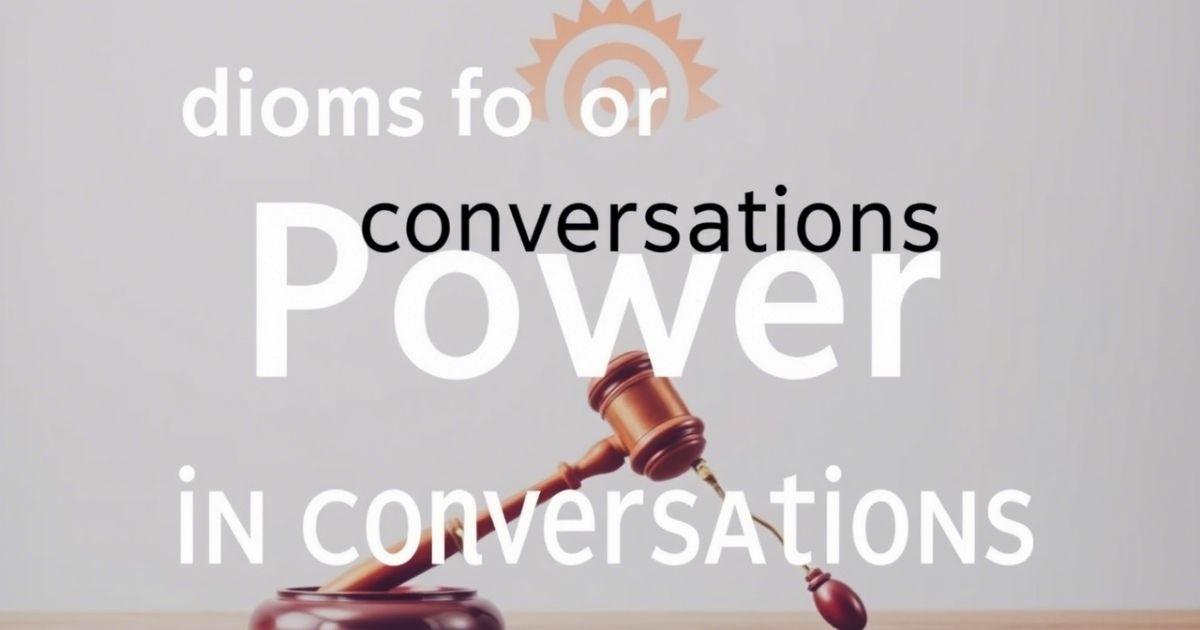Idioms for Power are phrases that help express influence and authority in different situations. They give language a punch, adding strength to communication. When you use these expressions, you show confidence and control. Idioms for Power like “call the shots” or “take the reins” are perfect for leadership. They help you take charge and make decisions.
These Idioms for Power are great tools for boosting your leadership skills. They are simple but powerful ways to show you’re in control. Phrases such as “pull rank” or “have the upper hand” show that you’re confident in your position. Knowing how to use Idioms for Power can help you gain respect in conversations and negotiations. These expressions are all about showing strength and influence in the right way.
What Are Idioms for Power?
Idioms for Power are phrases that convey control, influence, and authority in conversations. They help you communicate strength and confidence, making you sound more assertive. Whether you’re in a leadership role or just want to take charge of a situation, using Idiom for Power allows you to show your dominance in a subtle yet effective way.
Mastering Idiom for Power can boost your communication and negotiation skills. It makes you sound like someone who is in control and capable of making decisions. Here are five examples:
- Call the shots
- Take the reins
- Have the upper hand
- Pull rank
- Hold the cards
Power Idioms with Meaning and Examples

Power idioms are expressions used to convey control, influence, and authority. These phrases help communicate leadership and confidence in different situations. Here are some common power idioms and their meanings:
- Call the shots: To make the important decisions.
Example: As the team leader, Sarah calls the shots in every project. - Take the reins: To take control or assume responsibility.
Example: After the manager left, John had to take the reins and lead the team. - Have the upper hand: To be in a stronger or more advantageous position.
Example: With all the evidence, the lawyer had the upper hand in the trial. - Pull the strings: To control or influence events behind the scenes.
Example: The CEO may seem hands-off, but she’s the one pulling the strings in the company. - Hold the cards: To have the power or control over a situation.
Example: In negotiations, we hold the cards because we have the better offer.
- Take the bull by the horns – To confront a problem directly.
Example: Jane took the bull by the horns and dealt with the tough client. - Pull rank – To use one’s position of authority to influence a decision.
Example: The manager pulled rank to ensure his team got the best assignments. - Be in the driver’s seat – To be in control of a situation.
Example: With the new project, Laura is in the driver’s seat now. - Rule with an iron fist – To lead with strict authority and control.
Example: The dictator ruled with an iron fist, silencing all opposition. - Sit at the top of the food chain – To hold a dominant position.
Example: In this industry, the CEO sits at the top of the food chain. - Take center stage – To be the main focus of attention.
Example: At the conference, the keynote speaker took center stage. - Be the big cheese – To be an important or influential person.
Example: John is the big cheese in the marketing department. - Call the shots – To make the important decisions.
Example: As a project leader, Mark calls the shots for the entire team. - Have the last word – To have the final say or decision.
Example: After much debate, Sarah had the last word on the project proposal. - Hold all the cards – To have the power in a situation.
Example: With all the evidence on his side, he holds all the cards. - Be on top of the world – To feel extremely powerful or successful.
Example: After closing the big deal, Mark felt on top of the world. - At the helm – To be in control or leading a group.
Example: With Emily at the helm, the company saw major growth. - Lead the pack – To be the leader or the best in a group.
Example: As the most successful salesperson, Alice leads the pack. - In the driver’s seat – To be in charge of the situation.
Example: Now that we’ve signed the contract, we’re in the driver’s seat. - Be the master of one’s destiny – To be in control of one’s fate.
Example: By making strong decisions, she became the master of her destiny. - Make the rules – To set the guidelines or policies.
Example: As the head of the department, she makes the rules. - Take charge – To take control of a situation.
Example: When the team leader was absent, Steve took charge and led the project. - Hold sway – To have great influence or control.
Example: His opinion holds sway in the decision-making process. - The power behind the throne – A person who exercises power indirectly or secretly.
Example: She’s the power behind the throne, quietly influencing all the decisions. - Have the edge – To have a slight advantage over others.
Example: His quick thinking gave him the edge in the negotiation. - Run the show – To control the situation or event.
Example: John runs the show when it comes to product launches. - Be in charge – To have control or responsibility.
Example: As the manager, you’re in charge of overseeing the project. - Get the ball rolling – To begin the process or take action.
Example: Let’s get the ball rolling on this campaign by assigning roles. - Take over the reins – To assume control or leadership of something.
Example: After the manager left, Alice took over the reins and steered the team to success. - Pull the strings – To manipulate or control behind the scenes.
Example: The CEO pulled the strings to secure a major partnership. - In the driver’s seat – To be in a position of control.
Example: With the new contract in hand, the company is in the driver’s seat. - Be the top dog – To be the leader or most powerful person.
Example: After years of hard work, he’s the top dog in the industry. - Take a stand – To assert your position or opinion firmly.
Example: She took a stand and made sure her team’s ideas were heard. - Be the kingpin – To be the most important or influential person in a group.
Example: As the director of operations, she’s the kingpin in the company. - Be on top – To be the most successful or in control.
Example: After the merger, we are now on top of the industry.
These power idioms help you express leadership, control, and influence in various contexts, enhancing your communication skills.
Other Names for Clouds
- Cumulus
- Stratus
- Cirrus
- Nimbus
- Altostratus
- Altocumulus
- Cumulonimbus
- Stratocumulus
- Cirrostratus
- Cirrocumulus
Words for Clouds

- Cumulus
- Stratus
- Cirrus
- Nimbus
- Altostratus
- Altocumulus
- Cumulonimbus
- Stratocumulus
- Cirrostratus
- Cirrocumulus
- Fog
- Mammatus
- Thunderhead
- Cloudbank
- Skycover
- Puffy
- Veil
- Haze
- Mist
- Overcast
Power Synonyms and Antonyms
Power Synonyms and Antonyms reflect the varying degrees of control, strength, and influence one can have. Synonyms like authority, strength, and influence emphasize dominance, control, and leadership, while synonyms such as weakness, powerlessness, and vulnerability highlight a lack of control or influence. These words help convey the contrast between being in charge and being helpless, enriching our understanding of power dynamics in different contexts, from leadership to personal strength.
Related Guide:
Abbreviation for Unknown: Common Acronyms & Usage – Verbo Master
Synonyms for power:
| Synonym | Meaning | Example |
| Authority | The right or power to give orders, make decisions, and enforce obedience. | The manager had the authority to approve the project. |
| Control | The power to influence or direct people’s behavior or the course of events. | She had control over the situation during the meeting. |
| Strength | The quality or state of being physically strong or powerful. | His strength helped him overcome the obstacles in his way. |
| Influence | The capacity to have an effect on the character, development, or behavior of someone or something. | Her influence as a leader inspired the team to work harder. |
| Dominance | The power or influence over others, often leading or ruling them. | The company’s dominance in the market was evident. |
| Command | The power to direct or order. | The general issued a command to his troops. |
| Energy | The strength and vitality required for sustained physical or mental activity. | She channeled her energy into her career goals. |
| Clout | Influence or power, particularly in political or social contexts. | He used his clout to get the legislation passed. |
| Might | Great strength or power. | The might of the storm was enough to knock out the power lines. |
| Force | Strength or power exerted on something. | The police used force to break up the crowd. |
Antonyms for power:

| Antonym | Meaning | Example |
| Weakness | The state of being physically or emotionally weak or lacking power. | After the injury, he struggled with weakness and fatigue. |
| Vulnerability | The state of being open to harm or attack, lacking defense. | The country’s vulnerability to cyber-attacks worried officials. |
| Impotence | The inability to take effective action or have control. | His impotence in the matter left others to make the decisions. |
| Helplessness | The state of being unable to help oneself or others. | The child’s helplessness in the storm made people step in. |
| Powerlessness | The condition of lacking power or control over one’s environment. | The sudden resignation of the leader left the staff feeling powerlessness. |
| Subordination | The act of being placed in a lower or secondary rank or position. | His subordination to the boss was clear in all meetings. |
| Ineffectiveness | The quality of not producing the desired effect. | The manager’s ineffectiveness led to poor results. |
| Defenselessness | The state of being without defense or protection. | The defenselessness of the town made it vulnerable to attack. |
| Fragility | The quality of being delicate or easily broken. | The fragility of the plan became evident under scrutiny. |
| Feebleness | The state of being weak or frail, lacking strength. | The feebleness of his argument made it easy to counter. |
FAQ’s
What is the idiom related to power?
An idiom related to power is Idioms for Power like “call the shots” or “take the reins,” showing control and influence in any situation.
What is the power of idioms?
The power of idioms lies in their ability to convey complex ideas quickly. Idioms for Power can make your speech sound more confident and assertive.
What is an idiom for strong?
An idiom for strength could be “have the upper hand.” Using Idioms for Power boosts your presence and shows you’re in control of the situation.
What are the 10 idiomatic expressions?
Ten idiomatic expressions include phrases like “call the shots” and “pull rank.” These Idioms for Power help you assert authority and control over situations.
What are the 20 idiomatic expressions?
There are many Idioms for Power like “take the reins,” “call the shots,” and “have the upper hand.” These expressions show your leadership and influence.
Conclusion
Idioms for Power are a great way to express control and authority. These expressions add strength to your speech and show you’re confident. By using Idioms for Power, you can demonstrate leadership and influence in various situations. Phrases like “take the reins” or “call the shots” make you sound more assertive and in charge.
Mastering Idioms for Power helps you gain the upper hand in conversations and negotiations. They show you’re a mover and shaker, someone who knows how to make decisions. When you use Idioms, you take control of your environment and show others you’re in the driver’s seat. Whether you’re leading a team or having a casual chat, these idioms give you the confidence to stand strong. By knowing these Idioms for Power, you can enhance your communication and leadership skills.

Atlas Reid is an experienced administrator with 5 years of expertise in managing operations, streamlining processes, and ensuring efficiency. Skilled in leadership, organization, and problem-solving to drive business success.








